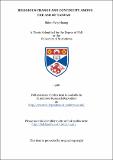Religious change and continuity among the Ami of Taiwan
View/
Date
07/1996Author
Supervisor
Funder
Metadata
Show full item recordAltmetrics Handle Statistics
Abstract
Within a few years of the end of World War Two Christianity had spread to every Taiwanese aboriginal group. Nowadays a variety of Christian churches play an important role in aboriginal society. This study is about conversion to Christianity and its aftermath in an aboriginal village. Fieldwork was conducted among the Ami (one of the nine Taiwanese aboriginal groups), in Iwan, a village on the eastern coastal of Taiwan. In this study the individual interests of social actors are emphasised. I suggest that not only political leaders had special motives (i.e. to pursue political power) in conversion, but also ordinary people had their own interests too (i.e. to pursue a better life in the future). In this sense we might say that the meanings, functions, purposes and aims imputed to religion by converts are arrived at through local dialogues. Religious conversion happened against a historical background of long and sustained contact with colonising immigrants (e.g. Japanese and Chinese). During colonial rule. Ami social life expanded radically and mass conversion took place, in the 1950s, when a common dissatisfaction with life was felt. I argue that relative deprivation was an important factor in this conversion and it became significant because of the emphasis put on it by local political leaders. The adoption of different Christian churches is best understood from the perspective of internal political relations and the careers of political leaders. In general I argue that through the articulations of prominent Ami leaders various external phenomena have been integrated into Ami life and successful articulations have also helped certain political leaders to pursue or maintain their authority.
Type
Thesis, PhD Doctor of Philosophy
Collections
Items in the St Andrews Research Repository are protected by copyright, with all rights reserved, unless otherwise indicated.

